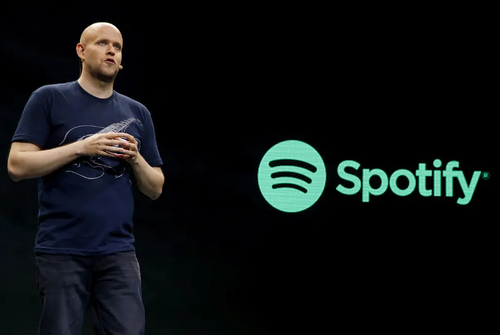Spotify Says Rogan Interview Did Not Violate Policies; Will Add "Content Advisory" Warnings
Spotify has responded to growing cries from the left to censor medical information which challenges or refutes official government bodies regarding Covid-19. Last week, artists Neil Young and Joni Mitchell removed their music from the platform to protest Joe Rogan over an interview with mRNA inventor and early treatment advocate Dr. Robert Malone, while others have been threatening to follow suit.

In a Sunday public letter, Founder and CEO Daniel Ek tried to strike a compromise between free speech advocates and those who want to eliminate wrongthink from public discourse under the guise of protecting the public from 'dangerous concepts.'
"We know we have a critical role to play in supporting creator expression while balancing it with the safety of our users," wrote Ek - who made no specific mention of Rogan. "In that role, it is important to me that we don’t take on the position of being content censor while also making sure that there are rules in place and consequences for those who violate them."
There’s been a lot of conversation about information regarding COVID-19 on Spotify. We’ve heard the criticism and we’re implementing changes to help combat misinformation. https://t.co/ic8jfR1RNR
— Daniel Ek (@eldsjal) January 30, 2022
Ek also said that Spotify would add a "content advisory" to any podcast episode which includes any mention of Covid-19, and will direct listeners to a "Covid-19 hub" where they can consume mainstream information regarding the virus.
Where does this leave Rogan?
A company spokesperson told Bloomberg that none of Rogan's episodes currently on the platform (which includes the Malone interview) violate Spotify's policies - a decision which risks fueling further outrage on the left, who may accuse the company of circling wagons around one of the most powerful voices in media to protect their bottom line.
Rogan has presented a public relations conundrum for Spotify ever since the company paid more than $100 million for the exclusive rights to his show. He offers a hospitable environment for guests with controversial points of view about the pandemic, politics and just about every other topic.
The criticism and controversy has thus far been worth it to the company’s leadership: Spotify’s stock price jumped the day they announced the deal, and Rogan hosts the single most popular podcast on its service. Spotify moved into podcasting hoping it would turn its popular but unprofitable music service into a more lucrative business. Investors cheered the efforts, though they have cooled on the company in recent months. Its stock has fallen 48% in the past 12 months, closing at $172.98 on Jan. 28 with a stock-market value of $33 billion. -Bloomberg
A cadre of aging leftist musicians vs...
Joe Rogan has completely disrupted the legacy media. pic.twitter.com/rBLCYweag0
— Pomp 🌪 (@APompliano) January 3, 2022
Spotify has also made public its rules governing acceptable content on the platform, but only made them available to employees.
Their 'medical misinformation' section pertains to "content that promotes dangerous false or dangerous deceptive medical information that may cause offline harm or poses a direct threat to public health.' Examples include:
- asserting that AIDS, COVID-19, cancer or other serious life threatening diseases are a hoax or not real
- encouraging the consumption of bleach products to cure various illnesses and diseases
- promoting or suggesting that vaccines approved by local health authorities are designed to cause death
- encouraging people to purposely get infected with COVID-19 in order to build immunity to it (e.g. promoting or hosting “coronavirus parties”)
Read the entire policy below:
Dangerous Content
Spotify is home to communities where people can create, express themselves, listen, share, learn, and be inspired. Don’t promote violence, incite hatred, harass or engage in any other behavior that may place people at risk of serious physical harm or death. What to avoid:
Content that advocates or glorifies serious physical harm towards an individual or group includes, but may not be limited to:
- encouraging, promoting, or glorifying suicide and self-harm (if you or someone you know is struggling or thinking about self-harm, please see here for ways to get help)
- inciting or threatening serious physical harm or acts of violence against a specific target or specific group
- content that promotes or supports violent extremist organizations
Content that targets an individual or identifiable group for harassment or related abuse includes, but may not be limited to:
- repeatedly targeting specific individuals with sexual advances
- sharing, threatening to share, or encouraging others to share someone’s private information, including credit card or banking information, National Identity numbers, etc.
Content that incites violence or hatred towards a person or group of people based on race, religion, gender identity or expression, sex, ethnicity, nationality, sexual orientation, veteran status, age, disability or other characteristics associated with systemic discrimination or marginalization includes, but may not be limited to:
- praising, supporting, or calling for violence against a person or group of people based on the characteristics listed above
- dehumanizing statements about a person or group based on the protected characteristics listed above
- promoting or glorifying hate groups and their associated images, and/or symbols
Content that promotes dangerous false or dangerous deceptive medical information that may cause offline harm or poses a direct threat to public health includes, but may not be limited to:
- asserting that AIDS, COVID-19, cancer or other serious life threatening diseases are a hoax or not real
- encouraging the consumption of bleach products to cure various illnesses and diseases
- promoting or suggesting that vaccines approved by local health authorities are designed to cause death
- encouraging people to purposely get infected with COVID-19 in order to build immunity to it (e.g. promoting or hosting “coronavirus parties”)
Content that illicitly promotes the sale of regulated or illegal goods includes, but may not be limited to:
- selling illegal firearms or firearm parts
- selling illegal drugs
- selling endangered species or products derived from endangered species
Content that promotes, solicits, or facilitates child sexual abuse or exploitation includes, but may not be limited to:
- visual depictions of a minor engaged in a sexual act or lascivious depictions of a nude minor
- promoting acts of sexual abuse against a child in exchange for money
- encouraging or promoting sexual attraction by adults towards minors
- promoting, normalizing, or glorifying child grooming behaviors
Deceptive Content
Creating great experiences on Spotify requires trust that people are who they say they are, that they won’t be scammed, and that no one is trying to manipulate our platform. Don’t use malicious practices to deceive others. What to avoid:
Content that impersonates others in order to deceive includes, but may not be limited to:
- replicating the same name, image, and/or description as another existing creator
- posing as another person, brand, or organization in a misleading manner
Content that promotes manipulated and synthetic media as authentic in ways that pose the risk of harm includes, but may not be limited to:
- audio or video recording that comes from a real and valid source that has been altered in a way that changes the meaning or context of the original media and is purported to be true, thus posing a risk of harm to the speaker or other individuals
- audio or visual media artificially created through the use of technology that’s purported to be true, such as digitally manufactured sexual audio and video content or content falsely suggesting that someone committed a crime
Content that attempts to manipulate or interfere with election-related processes includes, but may not be limited to:
- misrepresentation of procedures in a civic process that could discourage or prevent participation
- misleading content promoted to intimidate or suppress voters from participating in an election
Content that attempts to take advantage of the Spotify community includes, but may not be limited to:
- posting, sharing, or providing instructions on implementing malware or related malicious practices that seek to harm or gain unauthorized access to computers, networks, systems, or other technologies
- phishing or related attempts to deceptively solicit or collect sensitive information
- promoting investment and financial scams like “get rich quick” and pyramid schemes, or otherwise encouraging others to part with money under false pretenses
Sensitive Content
We have tons of amazing content on Spotify, but there are certain things that we don’t allow on our platform. Don’t post excessively violent or graphic content, and don’t post sexually explicit content. What to avoid:
Content that promotes graphic or gratuitous depictions of violence, gore, or other shocking imagery includes, but may not be limited to:
- severely mutilated or dismembered bodies
- promoting animal cruelty or torture
Content that contains sexually explicit material includes, but may not be limited to:
- pornography or visual depictions of genitalia or nudity presented for the purpose of sexual gratification
- advocating or glorifying sexual themes related to rape, incest, or beastiality
Illegal Content
The law is the law. No matter who you are, it is your responsibility to comply with applicable laws and regulations. What to avoid:
Content that violates applicable laws and regulations includes, but may not be limited to:
- content that does not comply with applicable sanctions and export regulations
- content that is intended to promote or commit an illegal act of any kind
Content that infringes the intellectual property rights of others includes, but may not be limited to:
- content provided to Spotify without obtaining necessary permissions
- content that infringes third-party copyrights or trademarks
https://ift.tt/wQE4Sdnur
from ZeroHedge News https://ift.tt/wQE4Sdnur
via IFTTT


0 comments
Post a Comment